- Home
- Francine Mathews
The Cutout cc-1 Page 2
The Cutout cc-1 Read online
Page 2
Eric refused all refuge. He grew hollow-eyed from strain and restless nights; he spoke sharply when he spoke at all. When she referred to a time beyond Buda, he lost the thread of conversation. Always a creature of discipline, he became, if anything, an ascetic-forgoing sleep, the after-embassy drinks hour, even her body in the small hours of morning. The night meetings ended increasingly at dawn, long after she had closed her book and put out her light. She would awake early and dress for the embassy in silence, her husband an insensate stranger shrouded amid the sheets.
Three months before the end of their tour, Eric accepted temporary duty in Istanbul for the summer. Caroline decided to head for the States the same day he left Budapest. She had no reason to go on to Turkey with him, no duty in Istanbul. She would work in Langley and hunt for a house. Headquarters would be glad to have her back — they never asked inconvenient questions. And perhaps absence would improve Eric's frame of mind.
Dispatch him from his present limbo, a restored creature.
I'll call you, he says as they stand in the echoing concourse of the Frankfurt airport. There are no lounge areas at the individual gates, no place to sit and talk. Bearded men too large for their tropical-weight suits are wedged between newspapers and duty-free bags, smoking endless cigarettes. Their wives pace the concrete floors in wrinkled saris, children curled in their arms like sacks of flour.
The international terminal is one vast waiting room between past and future, punctuated by drooping plants and security portals and guards with electronic sensors. Terrorism haunts the Frankfurt airport, because a decade ago a boom box wired by two Libyans was loaded from the tarmac into the baggage compartment of Pan Am 103. That flight ended in fiery chaos over a small town in Scotland. And now Frankfurt is determined to shut the barn door on the horse's ass.
It takes hours to process through security. Tourists disinclined to learn from history ignore the gate queues and raise their voices in complaint. Bags are opened, or x-rayed, or swathed in yellow twine. Forms are stamped. Cameras monitor. People stand and sweat and stare blankly with ill-defined tension. And at last, the baggage dismissed, they win the freedom of this concourse. Its sterility is almost harrowing.
Caroline clutches her boarding pass in her right hand, her carryon in her left, when what she really wants is to hold Eric until the breath leaves his body.
“I'll be at the Tysons Marriott,” she says.
“I'll let you figure out the time change between Istanbul and Virginia.”
She notices with half her mind that the Americans complain the loudest. They eddy in a tide of sweatsuits around the island that is Eric, convinced they deserve some sort of dispensation. They've paid in blood for world dominion, and this German obsession with order is an outrage. It smacks of cattle cars shunted to a Polish siding, of diversion to the death camp showers. Patience is a virtue Americans distrust.
Eric touches her cheek. Kisses her forehead chastely, as though in benediction. And turns away, his mind shifting elsewhere. Caroline stretches out her hand to his retreating back. But it is already too late. It is this she will remember, years later, when people ask. She will remember that they parted in silence.
Did he suspect what would happen that frantic April morning? Or did he go ignorant as a calf to his destruction?
Caroline drank the last of her coffee, the taste of sewage in her mouth. The jay beyond her window lifted its wings and flitted away; she was very close to being late for work.
When the news breaks, she thought, it's the one thing on everybody's mind, the question we never ask aloud. We shrug off disaster, hurl obscenities at the slow car in the fast lane, skip our workouts for a long lunch. But the question remains; it hovers like a priest's profile, half glimpsed through a confessional screen.
When a plane explodes five miles above the earth, how exactly do you die?
Over the past two years, she had pinned down some specific answers. Twelve of the passengers on MedAir 901 were found seventeen miles from the plane's point of impact, dead but still strapped into their seats. Five others — first-class passengers who sat directly over the forward baggage compartment, where investigators believed the bomb exploded — were incinerated at ignition. Seven of the taller members of the coach section were decapitated when a wing sheared off. Ninety-eight others never got out of the fuselage. But the worst of it, in Carolines opinion, were the ones who were sucked from their seats, to swirl with the air currents like leaves or empty candy wrappers high above the coast of Turkey. At thirty thousand feet they would lose consciousness in seconds, suffocate in the thin air, freeze in the subzero winds. And disintegrate on impact.
Even now, when she closed her eyes at night, she saw the children. There'd been twenty-one of them on MedAir 901, some of them teenagers, some of them still in diapers. Candy wrappers, all of them, in their pastel Easter clothes.
Eric's was one of the bodies they never found at all. Two and a half years of probing the metaphoric wreckage, a thousand days of questions thrown out into the clandestine universe, and Caroline still did not know how her husband had died.
It was Eric she longed for now, in the rain of Arlington, as she tossed the dregs of her coffee in the sink and padded down the length of carpeted hall to her solitary bedroom. She longed for the tautness of a thigh, the delicate flesh above the hip. The time of sweat that lived in the crease behind his knee. All these, she thought, all these are denied me. And the pain of it stopped her short in the doorway, to take a ragged breath, to calm herself, and to move then with resolution toward the closet door.
She was halfway up the George Washington Parkway when the news from Germany broke.
The CIA's Counterterrorism Center was in the grip of its daily frenzy. Tucked away on the ground floor of the New Headquarters Building, the CTC was a windowless three thousand square feet of stale air and blue industrial carpeting, where fifty — odd terrorism experts jockeyed for space and priority among a welter of cubicle partitions. It brought together CIA case officers, Intelligence analysts, FBI agents, and Secret Service detailees in a way that no government organization had ever attempted before. Turf battles and chains of command were set aside in the Center; here, the common threat took precedence.
There were people who knew Farsi and people who knew explosives and people who knew where Moammar Qaddafi slept each night; people who dreamed in Arabic, or understood counterfeiting, or chemical precursors, or how storage centers were hidden in the hearts of mountains. Here the stuff of fiction was commonplace — the satellite images of guerilla training camps, the electronic intercepts of private conversation. In Caroline's mind, it was the most fulfilling and exciting three thousand square feet in the entire world.
She paused at the door, expecting the inevitable — the bruising flight of one of her colleagues toward the hallway connecting the New Headquarters Building with the Old — and was rewarded with a sharp jolt in the rib cage as Sandy Courts careened past her.
“Sorry,” he muttered. And never looked up from the cable he was reading.
Sandy was a small, fussy, white-haired man with a correct British accent. His wire-rimmed spectacles were clouded with thumbprints. He disapproved of Caroline — Sandy disapproved of all young people on principle, and particularly female ones — and yet she regarded him with affection. He was a character straight out of George Smiley's Circus. And he knew everything there was to know about Beirut and Lebanon. If, while crossing the street in his distracted fashion, Sandy Coutts were to be hit by a bus one day, the collective memory of Middle East analysis would be wiped out in an instant.
Where partitions divided the room, a particular branch held sway: the Hizballah people, the Bin Laden people, the ones who followed the PFLP-GC. Caroline turned right on Bin Laden Lane and made her way to Via Krucevic. It was the place she called home in the CTC — the branch that watched the 30 April Organization. Its members were an elusive band of international killers — madmen, probably; psychotics and sadists and all-around
bad boys, certainly — but disciplined and deadly. Their agenda was simple. They wanted a Europe cleansed of the non-Aryan races; they waged terror in order to achieve it.
Thirty months earlier, they had blown up Eric's plane.
“Hey, Mad Dog.” Cuddy Wilmot was already standing by Caroline's desk. He was one of the few people allowed to call her that — the name Eric had given her after a reckless display of courage during her paramilitary training — but then, Cuddy had been Eric's friend. Now he was Caroline's. He was also her branch chief.
“The afternoon briefing at State is canceled,” he told her.
“Scottie's called a staff meeting for nine A.M.”
“Any news of the Veep? What hospital she's in?”
Something about Cuddy's face — the half-apologetic way he shoved the bridge of his glasses upward with one finger — warned Caroline that bad news was coming.
Cuddy never apologized.
“Have you seen the footage?” he asked.
“Didn't have time.” She glanced at a television monitor suspended from the ceiling; a few people were gathered in a tight knot under it. She started to walk toward Scottie Sorenson, the Center's director, but Cuddy grabbed her elbow.
“Come into my office.”
They serpentined through the huddle of desks, past fat piles of paper balancing rotary fans and coffee mugs tattooed with lipstick, past bookshelves bulging with academic journals and videotapes and yellowing scraps of newsprint. Other than the people watching the news, everybody in the place was bent over their terminals, intent on scanning the traffic that had been dumped overnight. Searching for the spoor that presaged a terrorist kill — the threat phoned in to an embassy, the report of a suspicious briefcase — anything that might scream culpability in the Berlin bombing.
“What is it?” she asked Cuddy, feeling her heart accelerate.
He closed his office door behind her. Not that it mattered; the walls were made of glass.
“I think you ought to see this in what passes for privacy.” He bent over the VCR and stabbed at a button.
“Why?”
He didn't answer. Everything about Cuddy — the sleeves of his yellow oxford cloth shirt rolled up to the elbows, the ugly polyester tie he kept in a desk drawer and knotted around his neck as an afterthought — was as it should be. But in the small room Caroline could feel his tension humming.
“You think this was done by our boys.” She said it quietly.
“That they hit the Gate. You think 30 April tried to kill the Vice President.”
“I don't know what to think. That I'm going insane, maybe. Have a seat, Caroline.”
The footage was German, pulled off the Agency's massive satellite dishes. She ignored the network voice-over and focused on the screen. A wide-angle shot of the new embassy, the crowd milling around Pariser Platz. A surprisingly nice day for Berlin in November.
“Who's the guy at the mike?” Cuddy asked.
“Dietrich, Graf von Orbsdorff,” she replied.
“Foreign minister. Former Christian Democrat turned Social Conservative. He fought with Helmut Kohl for two decades, then switched parties when Fritz Voekl and his fascist buddies moved into town.”
“He's dead,” Cuddy said without emotion.
Caroline took a deep breath and expelled it slowly. As a leadership analyst in the Office of Russian and European Analysis (a place known by the unfortunate acronym of DI/OREA), she had followed von Orbsdorff for nearly six years, before Scottie Sorenson had persuaded her to join the CTC. She knew everything about the German foreign minister — where he bought his suits and how much he paid, the address of the apartment where he kept his mistress, why his father had committed suicide before the Nuremberg trials.
“There's Payne,” Cuddy said.
“Watch closely.”
“Meine Damen und Herren …”
The Vice President looked so very small, Caroline thought, as she stood poised behind the podium. Her black hair, cut in a smooth bob to the chin, fluttered in the breeze. She wore a dark red suit well tailored, the color of blood.
“Interesting speech.” Caroline folded her arms across her chest, as though they might protect her from the coming blast.
“Probably not the one she was supposed to give.”
Cuddy did not reply.
And then Sophie Payne lifted her head, distracted by something off camera. A second later, the image rocked, then careened wildly out of focus.
“Veep's down,” Caroline said, eyes on the screen.
The television camera wheeled to face the Brandenburg Gate. The lens caught a mad stampede of bodies, the opened mouths screaming. Cuddy lowered the volume.
“Now watch.”
The film went blank. A pause, and then a helicopter filled the camera, wavering against a slate gray sky. A stretcher swung gracefully upward into its belly.
“That's Payne?” Caroline leaned forward, frowning.
“What exactly happened to her?”
“German liaison is claiming she was shot by a Turkish sniper. They found the guy with a slug in his head from a dead Secret Service agent's gun.”
“The agent's dead? Shit.”
“Twenty-eight people are dead, Carrie.” Cuddy said it savagely.
“Forget the Veep. Look at the belly of that chopper.”
He picked up the remote and rewound the tape. Again, the helicopter filled the screen.
“Look at the guy at the winch. Everyone's so focused on the goddamn stretcher they haven't even noticed.”
Caroline looked. She saw a man with unruly blond hair curling over his black leather jacket. Aviator sunglasses. Powerful shoulders. A thin blade of a nose. Wide lips pinched together in concentration. His hands reached out to steady the swaying stretcher, and with one glimpse of his strong, blunt fingers Caroline knew the truth.
She stumbled out of her chair and fell on her knees by the monitor. Splayed her hands across the screen as though that might bring him home.
The man in the chopper was Eric.
Three
Langley, 8:23 a.m.
“Okay. So she's probably not in 3. hospital.”
Caroline was pacing like a leopard on a short leash, five feet in one direction, five feet in the other. She wanted to run out of the Center, run madly down the hall, run to wherever Eric was at that moment. He's alive, he's alive. The bastard is alive.
“Sit down, Caroline,” Cuddy told her.
“Someone will notice. We don't want that to happen.”
She started to speak, started to hurl the anger of wasted years in his face — then sat down abruptly.
“You didn't know,” he said.
She looked up.
“Did you?”
“I wasn't married to him.”
His bitterness was like a sharp blow.
“Do you think I could pretend that he was dead? For two years? Or that Eric would trust me to do it?”
“Eric loved you, Mad Dog.” Cuddy studied a brown stain — coffee, probably — on the carpet at his feet. Unable, now, to meet her eyes.
“He trusted you with a lot.”
“Not with his life,” she retorted.
“Eric trusted nobody with that.” They were both silent a moment, the thought of Eric like another person in the room.
“It'd be one hell of a way for a terrorist to get information,” Cuddy said distantly.
“To have a wife in the middle of the most sensitive counterterrorism network in the world.”
“You know me better than that.”
“I thought I knew Eric.”
“Stand in line,” she whispered.
“Don't cry, Mad Dog. It doesn't suit you.”
He was wrong; she wasn't going to cry.
“Who else knows?” she asked.
Cuddy shrugged.
“Can't say. He looks different. There's the sunglasses, the longer hair.”
And most of the CTC personnel were fairly new. Their rotations throu
gh the Center were at the most two years old. They thought of Eric as a dead hero, one of the stars chiseled sharply on the Agency memorial. There was a good chance he had gone unrecognized.
“Scottie?” she asked.
“We'd have to tell Scottie in any case.”
“He'll go to Atwood. He'll have to.”
Cuddy shoved at his glasses impatiently.
“What do you want, Caroline? Your husband screwed the entire U.S. government this morning, okay?”
She tore open the door and sped toward the CTC directors office. Stumbled once on her high heels and swore out loud. It was a testament to the madness of the day that nobody even looked at her.
Scottie's door was open, but he'd turned off the fluorescent lights. He sat behind his desk in the unnatural gloom — white-haired, hollow-eyed, host to more parasites than medical science had isolated. His face bore a look that Caroline recognized. The look of a case officer alone in the field who knows he has been betrayed.
He was a private man who kept most people at a distance. He had graduated from Yale at a time when Intelligence was still glamorous, and he wore the code of silence like a good English suit — unobtrusive, yet tailored to the man. A string of ex-wives would argue that he was charming too charming for his own good and charm had made his career. Scottie's recruitments were like an exercise in seduction, and the rush of it all of taking a soul into the dark side of Intelligence kept him hungry for the field. He loved running agents, loved the dead drops in the deserted parking lots, the midnight surveillance, the unexpected take downs
Caroline thought that he had loved Eric.
It was Scottie who had pulled her husband off his first tour in Kabul, in the middle of the Soviet-Afghan war and sent him to Beirut. After Beirut it was Athens, where Scottie was Chief of Station. Then Nicosia. Then back to the CTC, where Scottie got the director's slot and made Eric his deputy. Only to send him to Budapest twenty months later, a decision that Caroline could barely forgive.

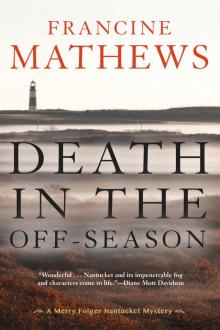 Death in the Off-Season
Death in the Off-Season Death in Rough Water
Death in Rough Water The Alibi Club
The Alibi Club Death of a Wharf Rat
Death of a Wharf Rat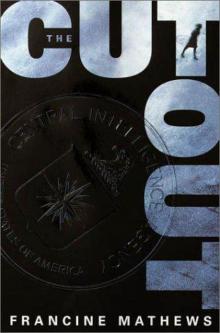 The Cutout
The Cutout The Secret Agent
The Secret Agent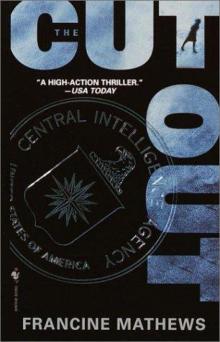 The Cutout cc-1
The Cutout cc-1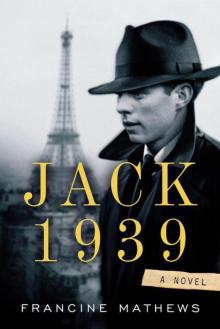 Jack 1939
Jack 1939 Death in a Cold Hard Light
Death in a Cold Hard Light Blown
Blown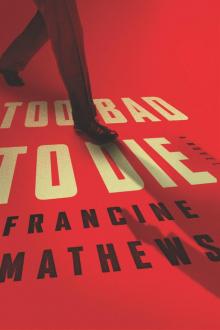 Too Bad to Die
Too Bad to Die